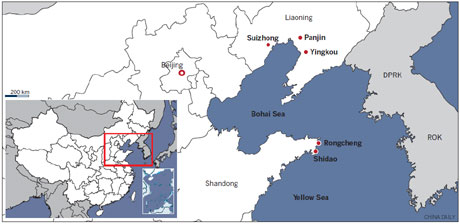Fishermen ride wave of discontent
Updated: 2012-01-13 07:33
By Cui Jia and Liu Ce (China Daily)
|
||||||||
'No expectation'
The clashes are expected to intensify as more Chinese fishermen feel they have no choice but to fish in South Korean waters.
Jia Yongsheng, 39, grew up in Erjiegou, a 100-year-old fishing village in Panjin, Liaoning province. In 2000, he said, he could make more than 200,000 yuan in one day by fishing for jellyfish. Last year, he filled only two buckets worth a total of 1,500 yuan.
"No one can make money now," Jia said. "Most of the boat owners tied their boats up along the quay so they will not lose money."
The boisterous and busy village has become chilly and lonely. Jia blames the continuing construction of a new harbor.
"Land reclamation and port construction change the geographic and geomorphic conditions underwater. As a result, migrating fishes could not come back again and have vanished little by little.
"I have lost tens of thousands of yuan and can only rely on my savings now," Jia said. And this year? "I have no expectation."
'Feed the families'
Meng Defu, who also is from Erjiegou, is 60 but he isn't ready to hang up his nets. "How can I survive without fishing?"
Like others, of course, he would rather "have our own fishes at home" than have to spend 10 to 15 days on each fishing trip to South Korea.
His boat, with a 70-ton capacity, has had a permit to fish off South Korea since 2001 but he chafes at regulations that "are getting stricter and stricter".
The South Korean standard on nets puts the hole size at 3.9 cm, and that's too big, he said. What's more, the total catch is limited to 10,000 kg a year.
He calculated that a fishing trip would require about 2 tons of gasoline and at least eight workers, for a total cost of about 120,000 yuan ($19,000). He could sell a 10,000 kg catch for the same amount.
"So if we don't cheat, we can't earn a living," Meng said. "You know, we have to feed the families."

That's why some fishermen have smaller net holes or hide some of their catch, and why they flee when they see South Korean coast guards approaching.
Fines for illegal fishing usually run between 30,000 and 50,000 yuan, he said, though sometimes top 100,000. Then, when the boat comes back to China, the local fishery bureau can confiscate its license.
Under that double whammy, frustrated fishermen try their best to avoid the coast guards. When spotted, they try not to let the guards on board. "This results in conflicts."
When Meng heard about the conflict last month involving Chinese captain Cheng Dawei, who is charged with murdering a South Korean coast guard, Meng was also fishing in South Korean waters. His catch at that point was paltry, but he hurried home.
Cracking down
Since 2006, the number of Chinese boats caught fishing illegally in South Korea's exclusive economic zone has reached 2,600, and the number of Chinese fishermen arrested is close to 800.
In the first 11 months of last year, the numbers were 439 boats (up 46 percent in a year) and 58 crew, coast guard spokesman Kim Dong-jin said. (No percentage was available for the arrests.)
In December, the South Korean government decided to increase the security collateral for boats captured while trespassing, from a top fine of 70 million won ($62,056) to 100 million won. The change began this month. Transferring fish to other boats will cost up to 70 million won.
The government also announced plans to spend 932.4 billion won ($811 million) through 2015 to better equip its forces in the crackdown on illegal fishing. That includes issuing more firearms than are currently provided to the country's anti-terrorism squad.
South Korean President Lee Myung-bak and Chinese leaders discussed illegal fishing during Lee's visit to Beijing on Tuesday. South Korea and China have pledged to continue regular meetings to resolve the issue.
Ju Chuanjiang contributed to this report. Write the reporters at cuijia@chinadaily.com.cn and liuce@chinadaily.com.cn.

 Relief reaches isolated village
Relief reaches isolated village
 Rainfall poses new threats to quake-hit region
Rainfall poses new threats to quake-hit region
 Funerals begin for Boston bombing victims
Funerals begin for Boston bombing victims
 Quake takeaway from China's Air Force
Quake takeaway from China's Air Force
 Obama celebrates young inventors at science fair
Obama celebrates young inventors at science fair
 Earth Day marked around the world
Earth Day marked around the world
 Volunteer team helping students find sense of normalcy
Volunteer team helping students find sense of normalcy
 Ethnic groups quick to join rescue efforts
Ethnic groups quick to join rescue efforts
Most Viewed
Editor's Picks

|

|

|

|

|

|
Today's Top News
Health new priority for quake zone
Xi meets US top military officer
Japan's boats driven out of Diaoyu
China mulls online shopping legislation
Bird flu death toll rises to 22
Putin appoints new ambassador to China
Japanese ships blocked from Diaoyu Islands
Inspired by Guan, more Chinese pick up golf
US Weekly

|

|






